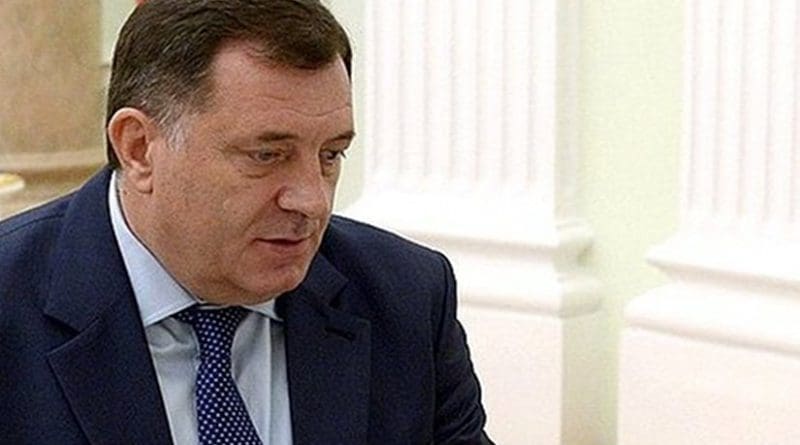Britain Sanctions Bosnian Serb Politicians For Pushing ‘De Facto Secession’ Of Republika Srpska
By RFE RL
(RFE/RL) — Britain has announced sanctions against Bosnian Serb politicians Milorad Dodik and Zeljka Cvijanovic, accusing them of attempting to undermine the legitimacy of Bosnia-Herzegovina by pushing policies that amount to a “de facto secession.”
Foreign Secretary Liz Truss cited the policies on April 11 and asserted that the pair had been “encouraged” by Russian President Vladimir Putin’s example.
“These two politicians are deliberately undermining the hard-won peace in Bosnia and Herzegovina. Encouraged by Putin, their reckless behavior threatens stability and security across the Western Balkans,” she said.
“With these tough sanctions we are showing that the enemies of peace will be held to account,” Truss added.
Dodik and Cvijanovic — the first to be targeted under London’s Bosnia sanctions regime — now face British travel bans and any assets or property they hold in the United Kingdom will be frozen.
Britain says that Dodik and Cvijanovic “have used their positions of authority to push for de facto secession of Republika Srpska…in direct contravention of the country’s constitution.”
Dodik, the Serb member of Bosnia’s tripartite presidency, has been trying to separate the entity’s military, police, and tax administration from the central Bosnian government, actions that contravene the 1995 Dayton accords that ended the Bosnian wars.
Dodik launched the action using “divisive, dangerous, nationalist rhetoric, disrupting domestic and regional peace and inciting ethnic hatred and genocide denial,” Britain said.
Before Dodik moved to launch the Serb withdrawal from Bosnia’s joint army in December, he traveled to Moscow, stoking the appearance that the move had the backing of Russia.
Cvijanovic, the president of the Republika Srpska entity, “publicly praised war criminals and denied the genocide in Srebrenica” in submitting draft laws in Republika Srpska that sought to transfer state competencies to the entity level, Britain said.
In response Dodik said that Republika Srpska would speed up the procedure to break contact and cooperation with the British ambassador to Bosnia.
He told a session of the Republika Srpska National Assembly that he did not care about the sanctions, had no property in Britain, and had not been there for 10 years.
He then read a statement from the British Embassy repeating Truss’s comments and stating that Dodik and Cvijanovic have acted in direct violation of the Dayton accords. After reading the statement he said, “Imagine all that nonsense.”
Cvijanovic also said during the parliamentary session that she does not have property or accounts in Britain and is not personally hurt by the sanctions.
The Dayton accords created two highly autonomous entities — Republika Srpska and the Bosniak-Croat Federation — that share some joint institutions. The country is governed and administered along ethnic lines established by the agreement, with a weak and often dysfunctional central government.
Dodik is under U.S. sanctions over corruption and threatening the stability and territorial integrity of Bosnia-Herzegovina.

